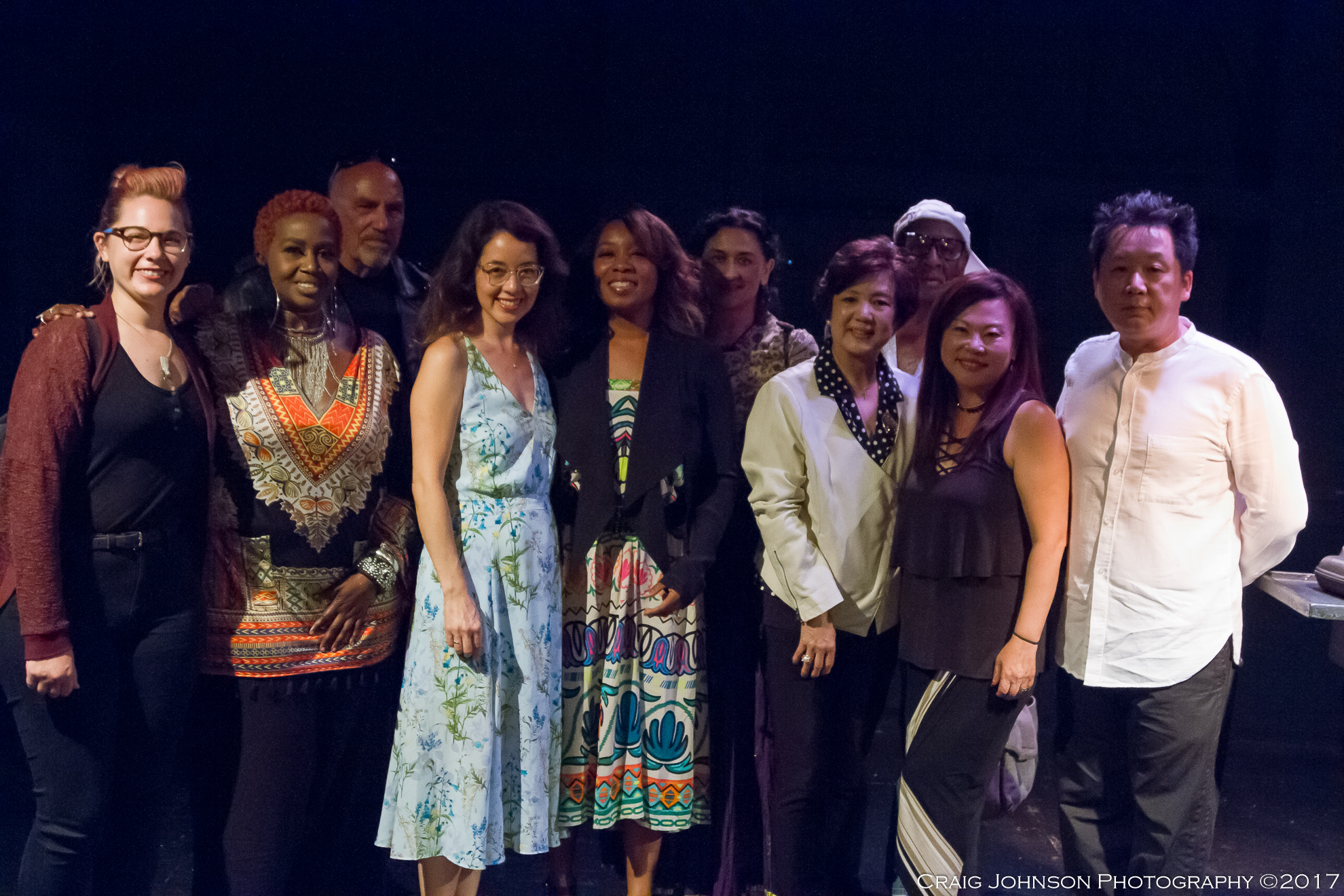Traversing California on the Rural Libraries Tour
The Rural Libraries Tour is a result of a seventeen-year partnership between Poets & Writers’ Readings & Workshops program and the California Center for the Book (CalBook), which sends writers into rural and underserved areas of California to teach creative writing workshops in libraries or at venues promoted by the libraries. Some workshops are bilingual (English and Spanish), some reach teens, and most reach all ages and types of people. As the eighteenth year of programming approaches, the participating writing instructors reflect on their experiences teaching these workshops.
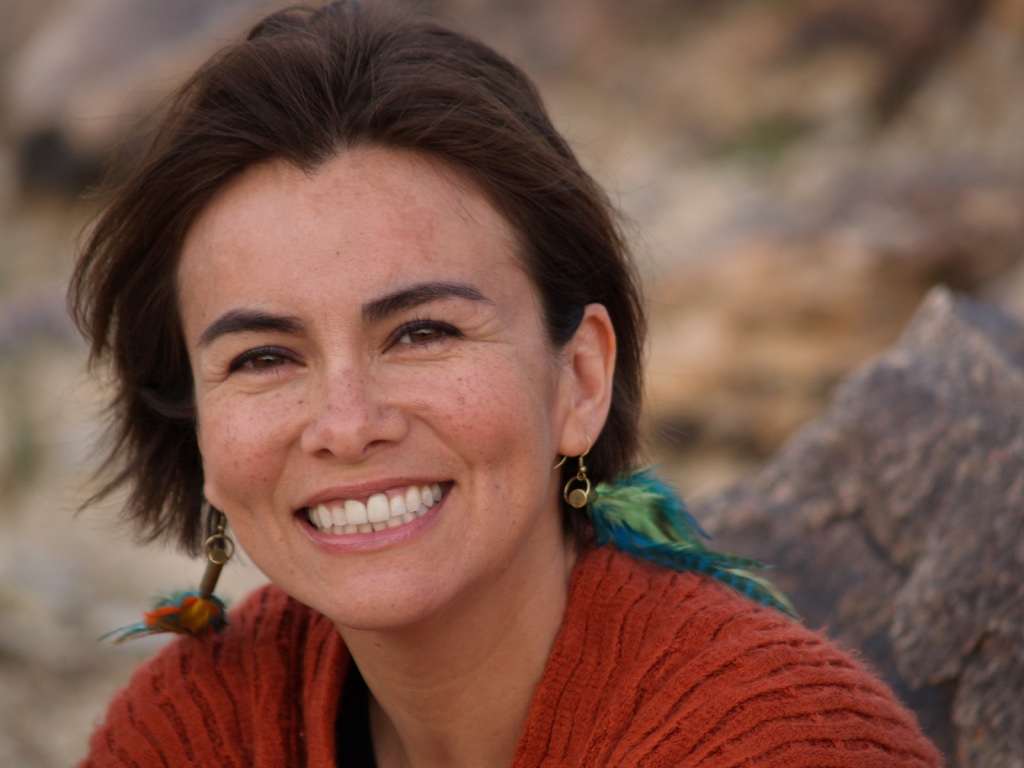 My visits to libraries in rural areas of Southern California are always a special treat for me as both an educator and an artist. In my regular teaching job, I am used to working with students for an extended period of time. With the Rural Libraries Tour, I am often entering completely new spaces with people I will probably never see again. Yet, in every single workshop that I have conducted during the past nine years, I have felt very much at home. I believe this is because the love of words and the desire to create binds us, regardless of where we are and if we will meet again. The potential for meaningful connections via words and art (even in a short amount of time) is always possible.
My visits to libraries in rural areas of Southern California are always a special treat for me as both an educator and an artist. In my regular teaching job, I am used to working with students for an extended period of time. With the Rural Libraries Tour, I am often entering completely new spaces with people I will probably never see again. Yet, in every single workshop that I have conducted during the past nine years, I have felt very much at home. I believe this is because the love of words and the desire to create binds us, regardless of where we are and if we will meet again. The potential for meaningful connections via words and art (even in a short amount of time) is always possible.
My poetic spirit is nourished in amazing ways each time. We don’t just read and write, we share intimate parts of ourselves and, collectively, we create. It’s amazing how often participants linger past the workshop to express how much they enjoyed being able to tap into themselves and write something that surprises them. There is a glow about them that is familiar; I know that feeling of having created something and feeling empowered or proud. These workshops—they’re a dynamic exchange of creative energy and they always reaffirm my love of poetry and community.
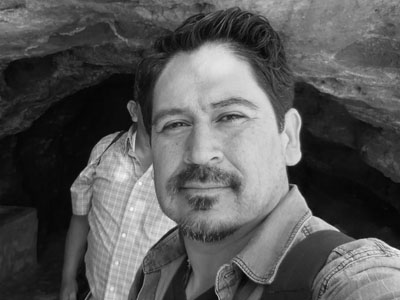 I’ve driven the road to Hollister, California numerous times over the past several seasons that I’ve participated in the Rural Libraries Tour, but this time was special. After having just released my book, All They Will Call You (University of Arizona Press, 2017), based on the famous 1948 plane crash that killed twenty-eight Mexican migrant workers, I knew I was returning to a community that not only knew the realities of migrant life very well, but more than that, Hollister is positioned on the western slope of the very canyon that the plane crashed down on—Los Gatos Canyon.
I’ve driven the road to Hollister, California numerous times over the past several seasons that I’ve participated in the Rural Libraries Tour, but this time was special. After having just released my book, All They Will Call You (University of Arizona Press, 2017), based on the famous 1948 plane crash that killed twenty-eight Mexican migrant workers, I knew I was returning to a community that not only knew the realities of migrant life very well, but more than that, Hollister is positioned on the western slope of the very canyon that the plane crashed down on—Los Gatos Canyon.
I was visiting with students, most of whom had come from migrant farm working families. They had never heard of this story before, but felt an immediate connection to it. They were rapt, and we conversed and shared stories for what seemed like hours. The most beautiful part came in the final minutes when students began asking if one of the passengers on the plane was named Rodriguez. And then another asked about the name Martinez. Another still wanted to know if there was a Ruiz who was killed. They were each going to go home and share this story with their parents. Perhaps they too were related. This is the power of stories, I nodded to myself. I never know what exchange will impact the people I get to work with, as well as myself. But always, I leave feeling grateful.
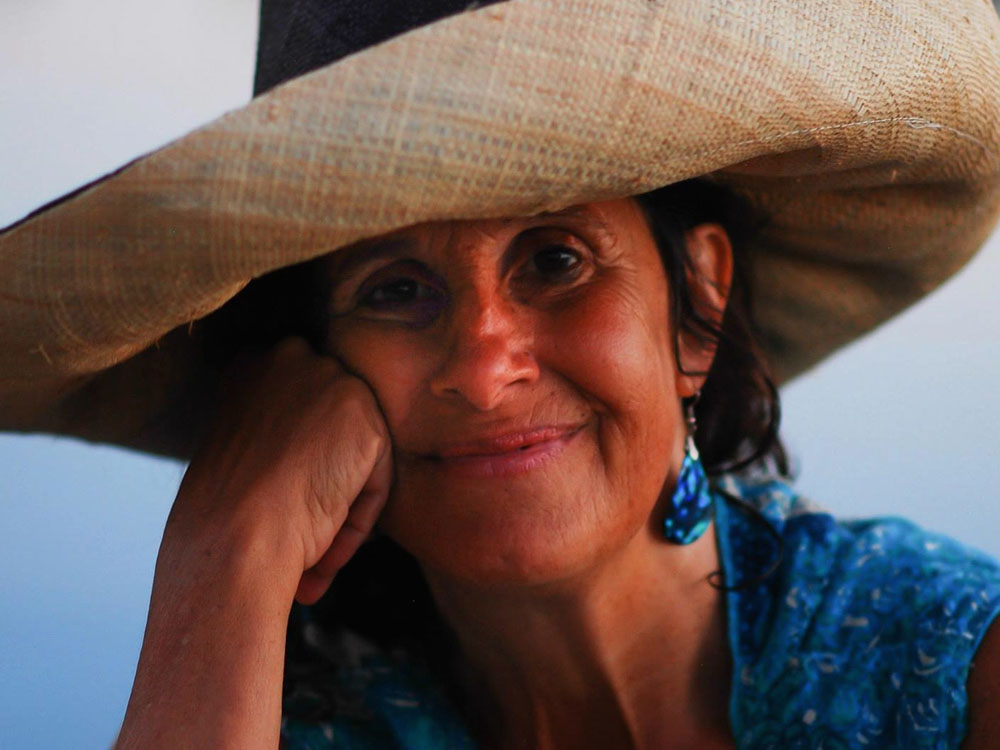 I’m happiest when people of all ages and ethnicities appear at workshops. Including the California border towns of Imperial and Crescent City, I’ve visited small libraries tucked in Markleesville, Placerville, Alturas, Yreka, Etna, and Weaverville (in the Trinity Alps), Susanville and Quincy where, always, surprisingly gifted youngsters, teens, and adults appear with their pens and their souls waiting for expression. Most recently, twenty people gathered on round tables at the Shasta Library in Redding.
I’m happiest when people of all ages and ethnicities appear at workshops. Including the California border towns of Imperial and Crescent City, I’ve visited small libraries tucked in Markleesville, Placerville, Alturas, Yreka, Etna, and Weaverville (in the Trinity Alps), Susanville and Quincy where, always, surprisingly gifted youngsters, teens, and adults appear with their pens and their souls waiting for expression. Most recently, twenty people gathered on round tables at the Shasta Library in Redding.
Our workshops together have welcomed me into the heartland of California as part of a larger mission: to bring love of language to small-town California. I’ve been heartened and changed as part of our years-long, far-and-wide endeavor. I feel delight and honor and, hey, almost “credible!” I feel held and loved by the support and camaraderie (not to mention pay!) provided by Poets & Writers and the California Center for the Book. These years of sessions nourish and transform my own writing. My (almost finished!) book about land and language includes many chapters about experiences and revelations in small libraries—“Damien’s Waterfalls” (South Lake Tahoe), “Sublime Limes” (Colusa), and “Cesar Stealing Words” (Williams), to name a few. Our rural libraries outreach adds a wildly colorful dimension to my writing and life.
Support for Readings & Workshops in California is provided by the California Arts Council, a state agency, and the National Endowment for the Arts, a federal agency. Additional support comes from the Friends of Poets & Writers.
Photo 1: Olga García Echeverría (Credit: Maritza Alvarez). Photo 2: Tim Z. Hernandez (Credit: Tim Z. Hernandez). Photo 3: Susan Wooldridge (Credit: Shannon Iris).





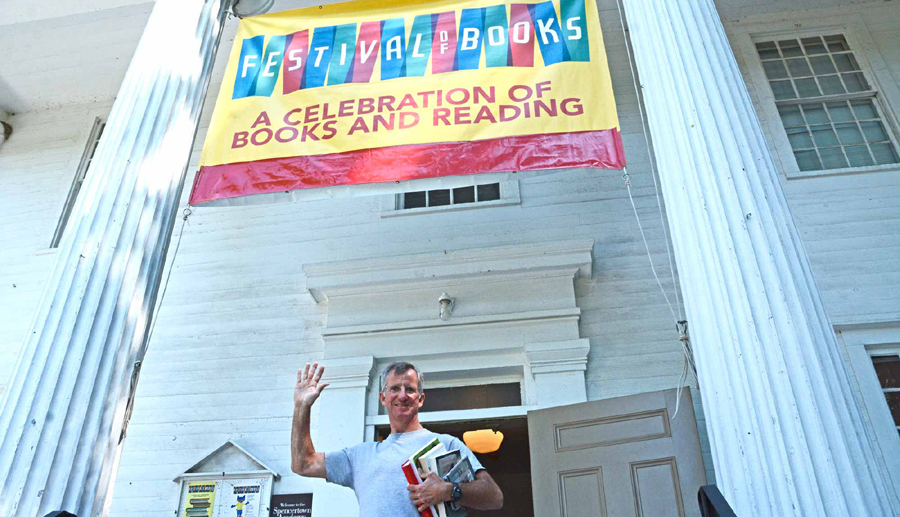
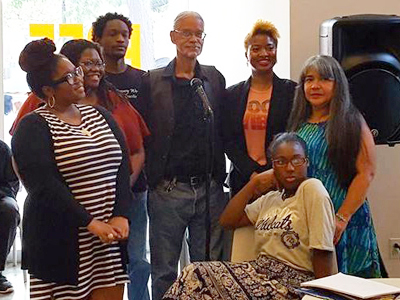 At the beginning of the first in a series of six “Spoken Word 101” workshops at the Bronx Museum of the Arts, I made it clear that I wasn’t going to teach anyone to be a better poet or spoken word artist. We were gathered to support each other as we explored the world of spoken and written word. For inspiration we read and discussed some of the verses of Aja Monet, Charles Bukowski, Nanao Sakaki, Sonia Sanchez, and other authors. Also, every session included the viewing of a YouTube video of these poets reciting their works.
At the beginning of the first in a series of six “Spoken Word 101” workshops at the Bronx Museum of the Arts, I made it clear that I wasn’t going to teach anyone to be a better poet or spoken word artist. We were gathered to support each other as we explored the world of spoken and written word. For inspiration we read and discussed some of the verses of Aja Monet, Charles Bukowski, Nanao Sakaki, Sonia Sanchez, and other authors. Also, every session included the viewing of a YouTube video of these poets reciting their works.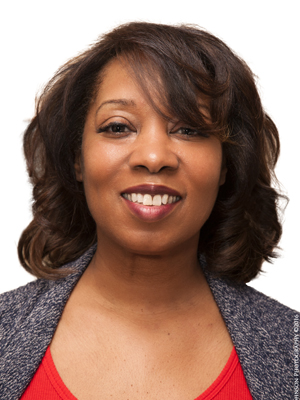 Each time an inner-city job seeker walks through our doors, we see unparalleled treasure. To make sure audiences and employers see it too, we know our job is to deliver light into deep dark places. The voices and stories of our students are buried under life’s toughest circumstances: homelessness, joblessness, abuse, addiction, and military trauma, among others. Our students are adults, often marginalized, fighting to survive and searching for work in the homeless capital of America: Los Angeles.
Each time an inner-city job seeker walks through our doors, we see unparalleled treasure. To make sure audiences and employers see it too, we know our job is to deliver light into deep dark places. The voices and stories of our students are buried under life’s toughest circumstances: homelessness, joblessness, abuse, addiction, and military trauma, among others. Our students are adults, often marginalized, fighting to survive and searching for work in the homeless capital of America: Los Angeles. In our classes, it is common to have students who have been rendered mute by the brutal blows they’ve faced, and Norma was no exception. A middle class woman hurled into silence and homelessness by domestic violence, she’d lost her will months before we met. Norma said, “I was preparing to take my life but this class opened my heart to see beyond my darkness and despair and showed me the greatness that was always there. Now I use my voice in the service of others like me. I use my talent to create change.”
In our classes, it is common to have students who have been rendered mute by the brutal blows they’ve faced, and Norma was no exception. A middle class woman hurled into silence and homelessness by domestic violence, she’d lost her will months before we met. Norma said, “I was preparing to take my life but this class opened my heart to see beyond my darkness and despair and showed me the greatness that was always there. Now I use my voice in the service of others like me. I use my talent to create change.”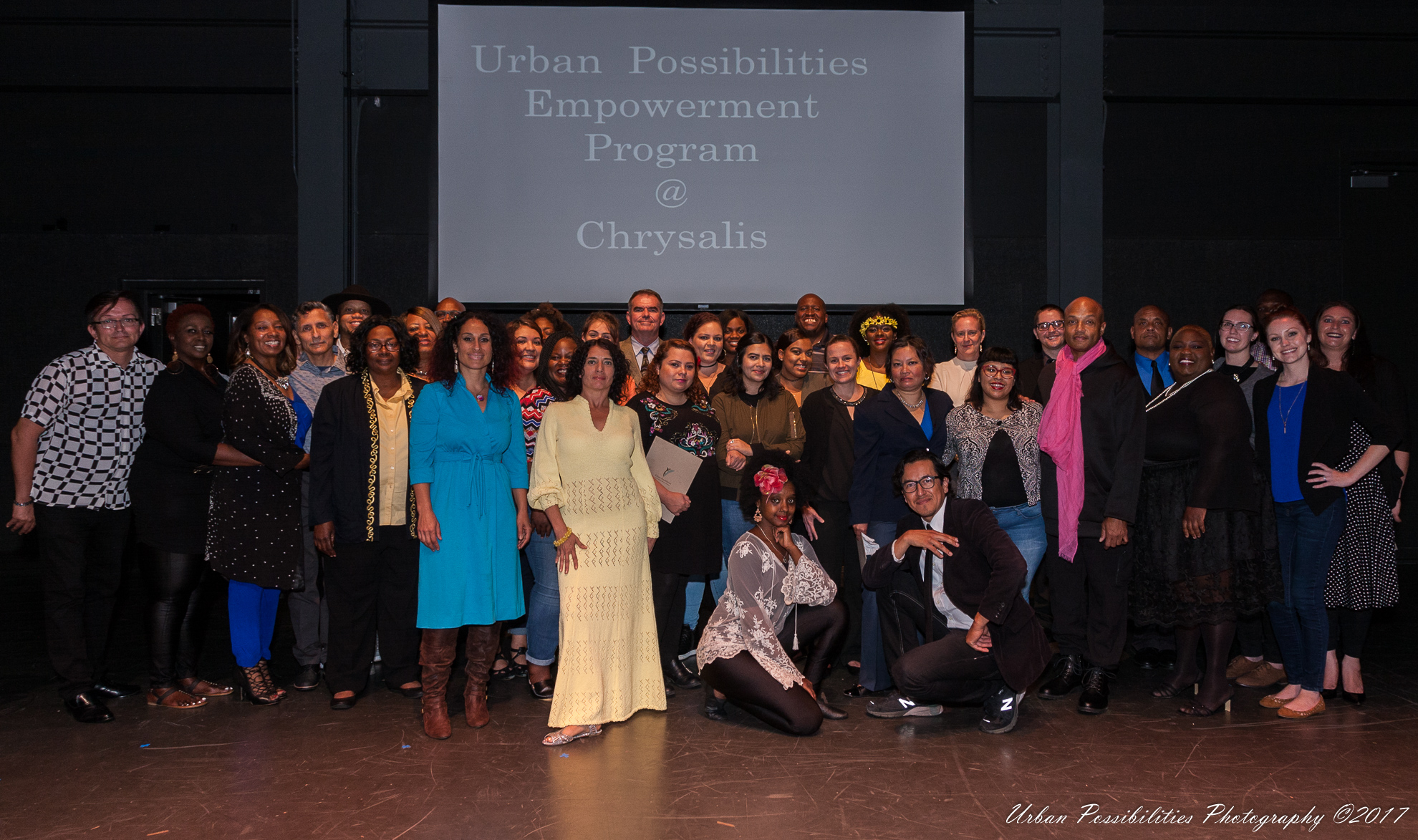
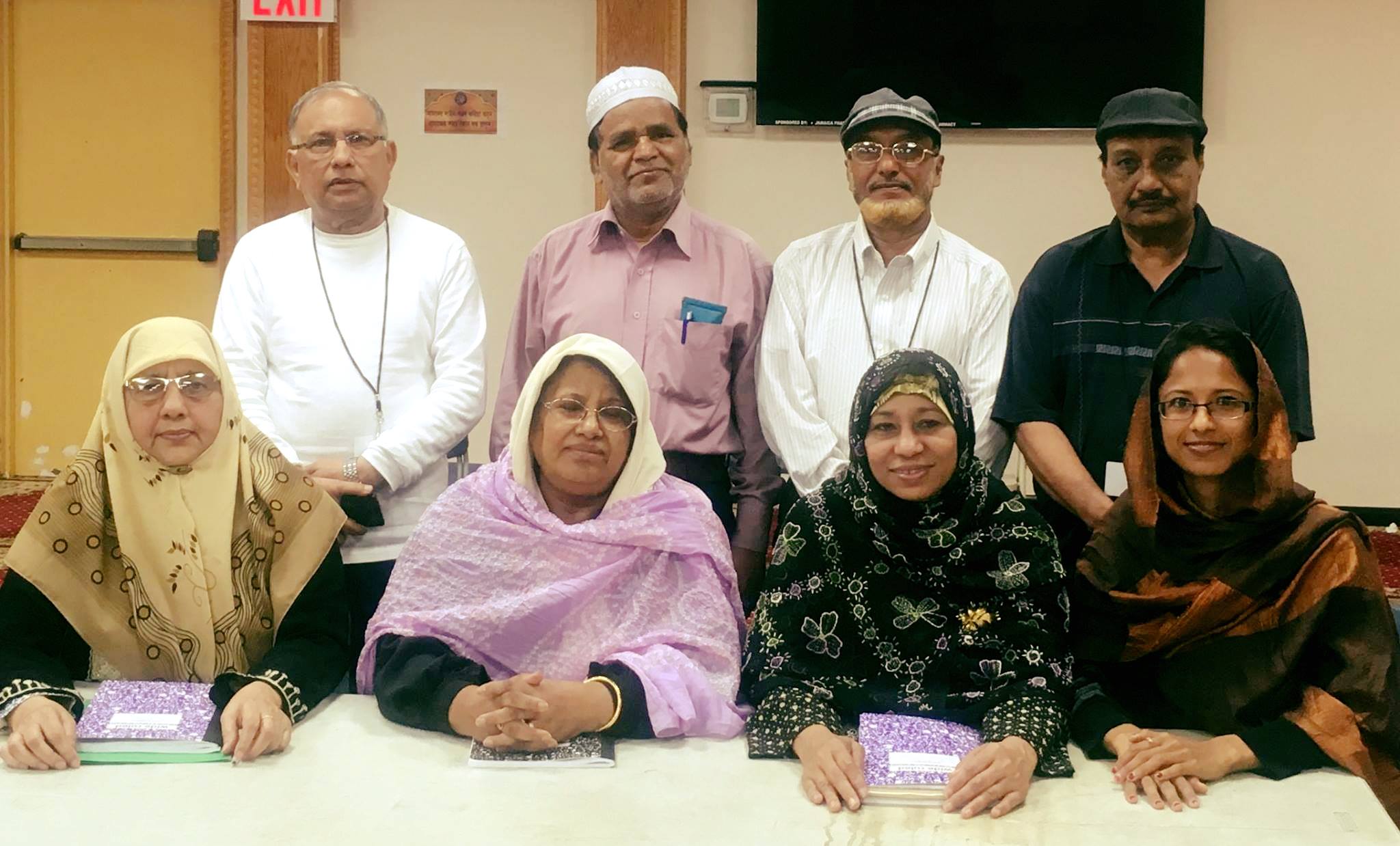
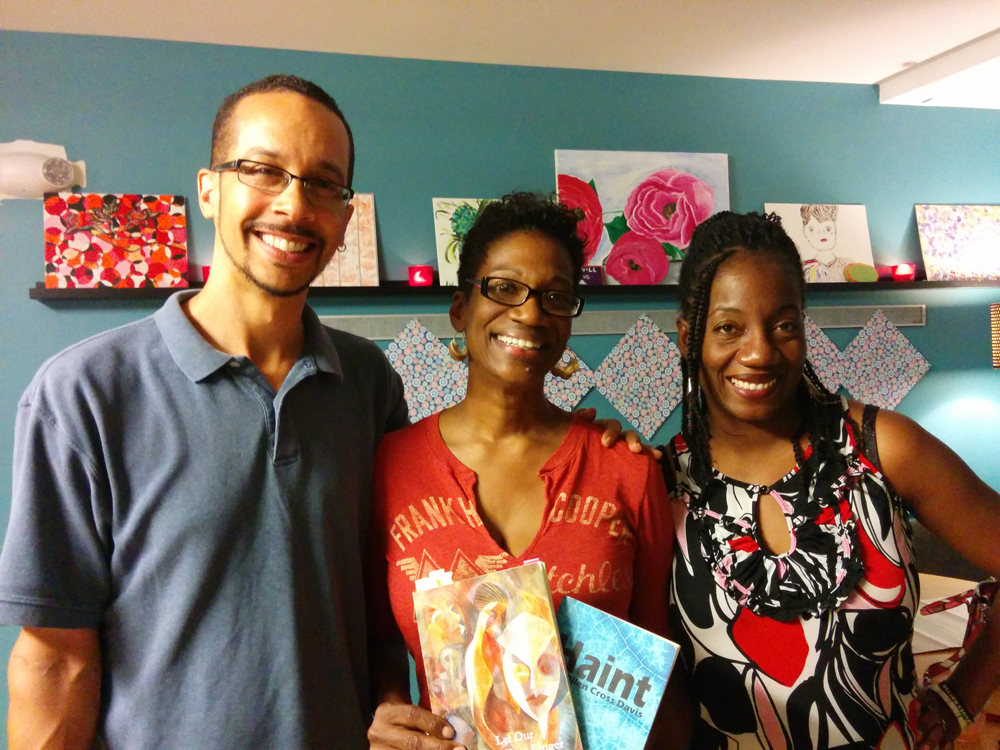 The P&W–supported reading series took place over the course of three beautiful summer Sundays (July 9, 16 and 30) and featured five outstanding poets from the D.C. area—Teri Ellen Cross Davis, Hayes Davis, Katherine McCord, Saundra Rose Maley, and Nancy Arbuthnot. The poets were selected for their cultural relevancy, as well as the ability to connect with diverse populations—the majority of women living at Calvary are survivors of domestic violence, are learning to manage a mental illness, and/or are in recovery from substance abuse.
The P&W–supported reading series took place over the course of three beautiful summer Sundays (July 9, 16 and 30) and featured five outstanding poets from the D.C. area—Teri Ellen Cross Davis, Hayes Davis, Katherine McCord, Saundra Rose Maley, and Nancy Arbuthnot. The poets were selected for their cultural relevancy, as well as the ability to connect with diverse populations—the majority of women living at Calvary are survivors of domestic violence, are learning to manage a mental illness, and/or are in recovery from substance abuse.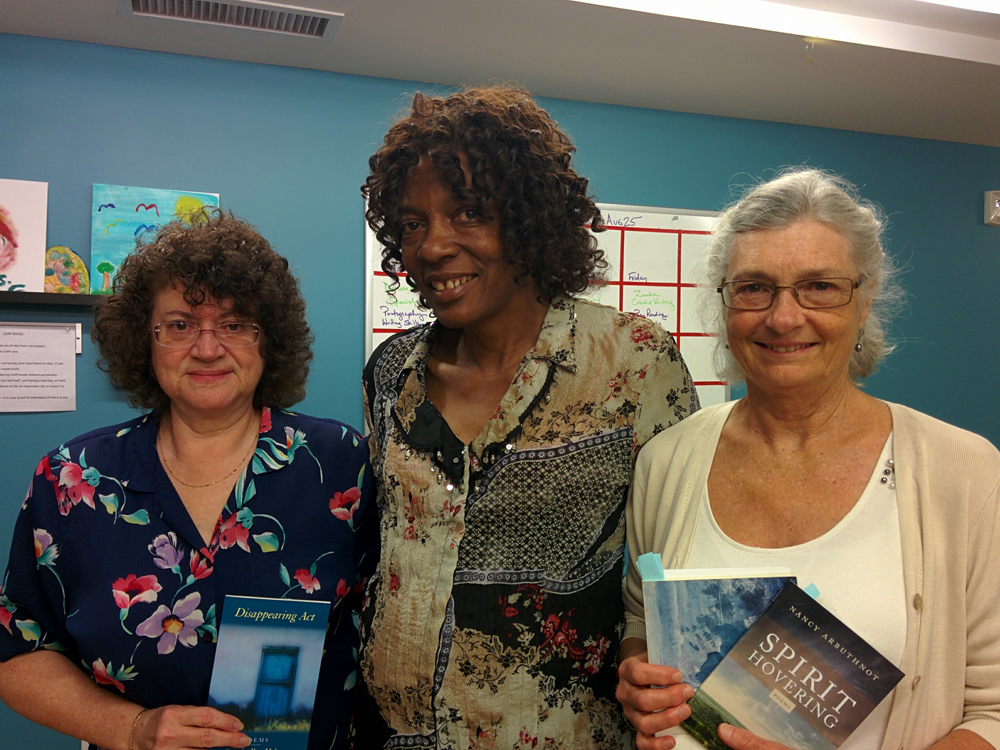 Elaine Johnson, who coordinates LEAP and witnesses women’s artistic sides firsthand, noted: “Echoes in These Streets deepened women’s relationship with writing. At the last session, the women were discussing the idea of continuing to meet on Sunday evenings to share and discuss their own poetry—and I see that as evidence of the lasting effect of the series!”
Elaine Johnson, who coordinates LEAP and witnesses women’s artistic sides firsthand, noted: “Echoes in These Streets deepened women’s relationship with writing. At the last session, the women were discussing the idea of continuing to meet on Sunday evenings to share and discuss their own poetry—and I see that as evidence of the lasting effect of the series!” In late 2016, I received an invitation to lead a workshop for first-time writers. Sponsored by the Friends of the Little Tokyo Branch of the Los Angeles Public Library and Poets & Writers, the four-part program targeted second-generation Americans of Japanese descent, the Nisei.
In late 2016, I received an invitation to lead a workshop for first-time writers. Sponsored by the Friends of the Little Tokyo Branch of the Los Angeles Public Library and Poets & Writers, the four-part program targeted second-generation Americans of Japanese descent, the Nisei.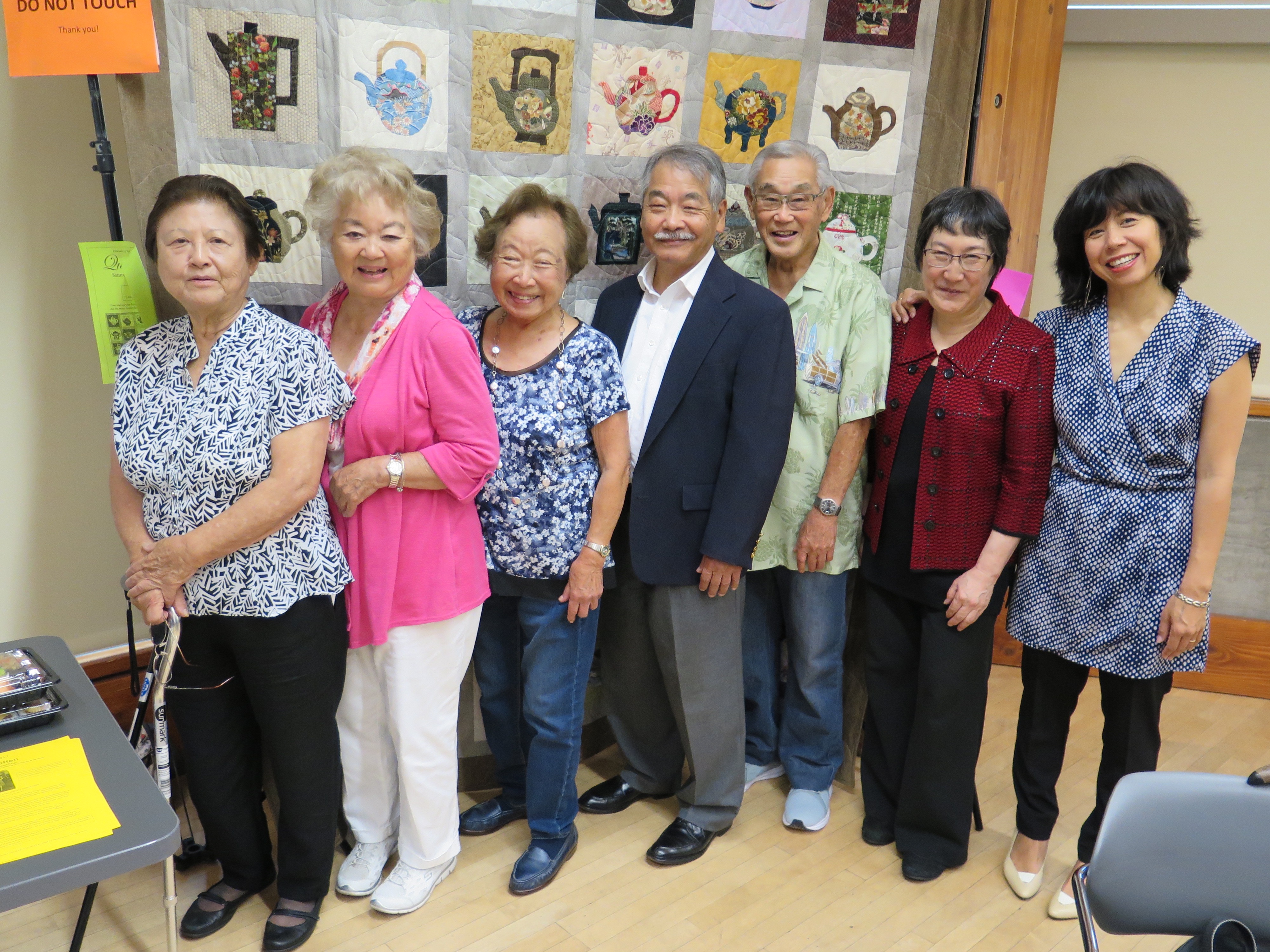
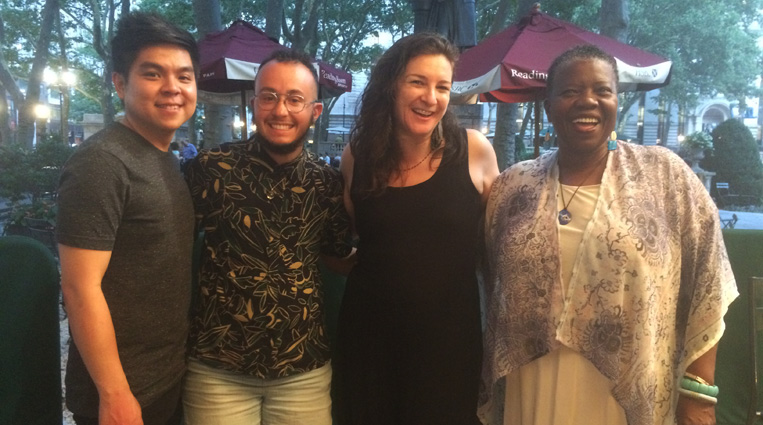
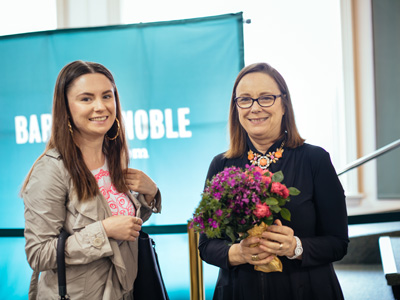 The Poets & Writers’ Connecting Generations Sixteenth Annual Intergenerational Reading took place on Saturday, June 17 at Barnes & Noble at Union Square in New York City.
The Poets & Writers’ Connecting Generations Sixteenth Annual Intergenerational Reading took place on Saturday, June 17 at Barnes & Noble at Union Square in New York City.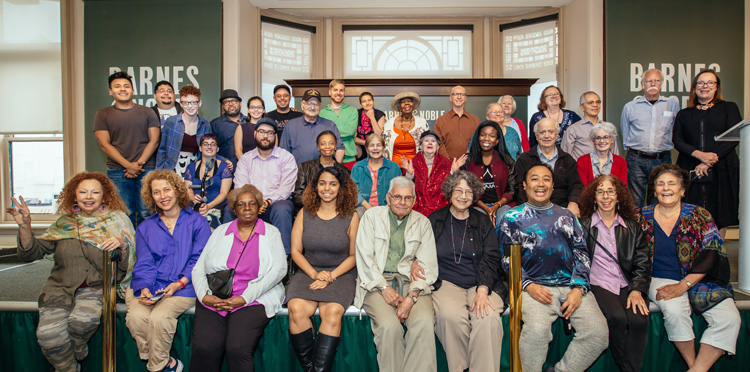
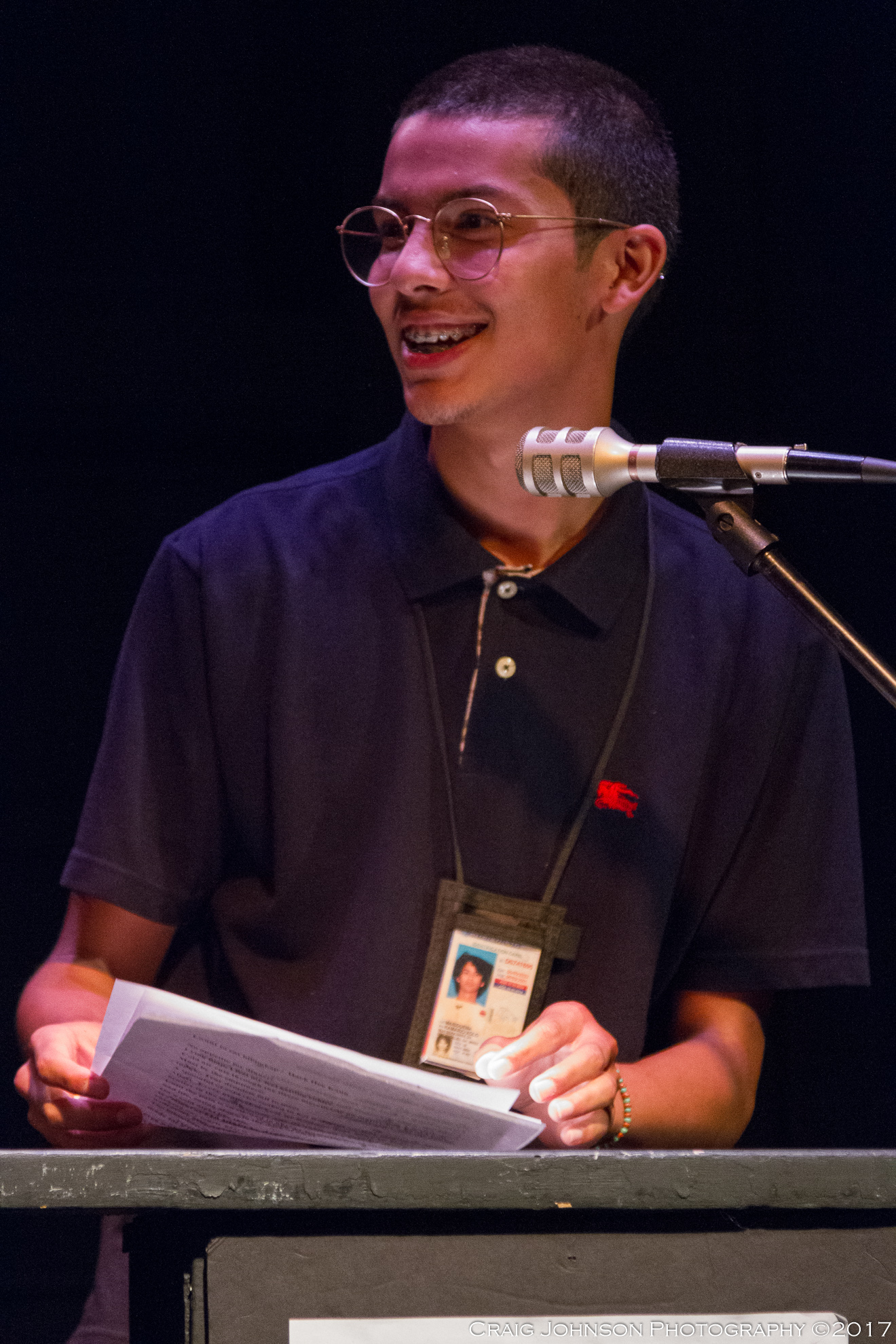 Among the eleven readers, who all gave strong readings, were four teen writers, including Xolo Maridueña, a fifteen-year-old sophomore who attended a R&W–supported writing workshop with Jeff Chang at the Boyle Heights Arts Conservatory in March. Xolo read his first poem ever—a poem about falling in love, in which he wrote: “When I would see her, the butterflies in my stomach would turn into pterodactyls,” an experience I’m sure many in the audience could relate to. Also writing on the theme of love was another teen writer, Ashla Chavez Razzano, representing 826LA, who wrote, “a spider’s web taught me to love.” Nadia Villegas, also representing 826LA, read a poem about how “blue nail polish is freedom,” and Vera Castañada from the Boyle Heights Arts Conservatory called the neighborhood around Cesar Chavez Avenue where she grew up, “the West Coast Ellis Island.”
Among the eleven readers, who all gave strong readings, were four teen writers, including Xolo Maridueña, a fifteen-year-old sophomore who attended a R&W–supported writing workshop with Jeff Chang at the Boyle Heights Arts Conservatory in March. Xolo read his first poem ever—a poem about falling in love, in which he wrote: “When I would see her, the butterflies in my stomach would turn into pterodactyls,” an experience I’m sure many in the audience could relate to. Also writing on the theme of love was another teen writer, Ashla Chavez Razzano, representing 826LA, who wrote, “a spider’s web taught me to love.” Nadia Villegas, also representing 826LA, read a poem about how “blue nail polish is freedom,” and Vera Castañada from the Boyle Heights Arts Conservatory called the neighborhood around Cesar Chavez Avenue where she grew up, “the West Coast Ellis Island.”